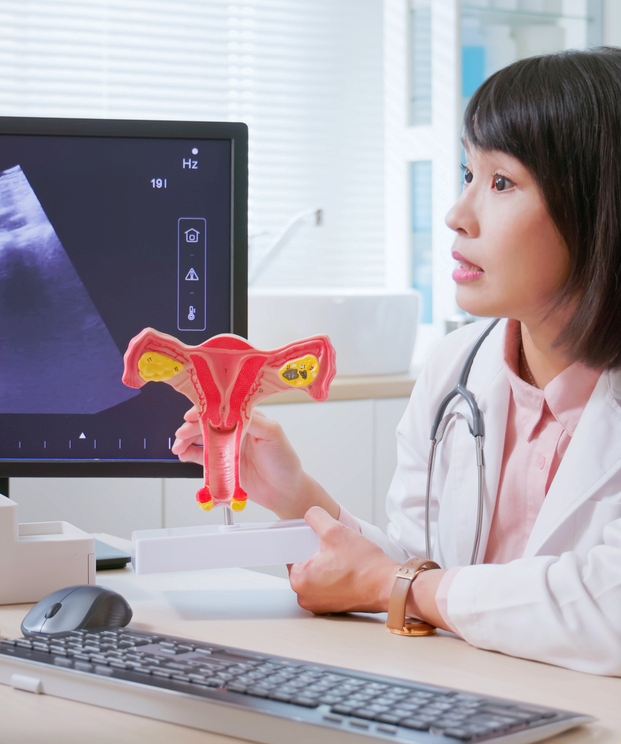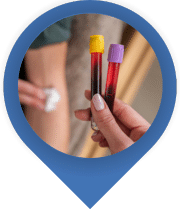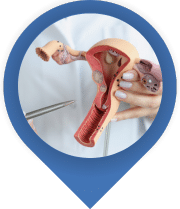The Latest Healthcare News
Check out our blog to learn more from our team about the latest medical advancements, health tips, and primary care news.

At AllCare, we understand how menopause symptoms can affect your daily life. Our experienced health experts are dedicated to helping you navigate the unique symptoms of menopause. From menopause therapy and non-hormonal therapies to comprehensive menopause care and HRT, we prioritize your well-being every step of the way.

Every woman experiences menopause differently. For some, their symptoms may affect how they feel both physically and emotionally. In addition to menopause, we also treat other hormonal conditions like polycystic ovarian syndrome (PCOS). This hormonal imbalance causes women to produce less estrogen and more androgens, otherwise known as male hormones. PCOS can be diagnosed at any time after puberty, and it’s a lifelong condition that needs to be managed even after menopause.
There are many ways to manage menopause symptoms, and sometimes, it may take time to find what works for you. At AllCare, we offer a comprehensive approach to healthcare for all women, including those experiencing symptoms of peri- or post-menopause. Our all-in-one model of care means you can receive your annual wellness check, preventative care, and specialty services, including treatment for menopause symptoms and PCOS treatments, in one convenient location. By streamlining your care through one menopause doctor at AllCare, we can eliminate your need to see separate specialists.
Menopause is a natural biological process that marks the end of a woman’s reproductive years. For every woman, menopause doesn’t just occur overnight; it happens in three stages:

Through personalized care, we provide guidance and support for managing menopausal symptoms, including hot flashes, mood changes, and hormonal adjustments, promoting women’s overall well-being during this transitional phase.

Comprehensive menopause testing and diagnostic assessments are conducted to understand and address menstrual disorders, such as irregular periods, heavy bleeding, or menstrual pain, helping women achieve optimal menstrual health.

Blood tests play a critical role in evaluating overall health. In the case of menopause, blood tests may be performed to rule out other conditions, like hyperthyroidism (overactive thyroid), that present with the same symptoms. Blood tests can also detect irregular hormone levels, which can indicate perimenopause.

Our perimenopause treatment includes bone health screenings, personalized medications or hormone therapies for menopause relief, and lifestyle advice to manage hot flashes and stress. We also provide specialist referrals for any related health concerns.

Screening, prevention, and management of osteoporosis focus on bone health, including assessment of bone density and implementing strategies to reduce the risk of fractures and maintain skeletal strength.

Medications may be prescribed to help ease your symptoms. They may include hormone replacement therapy (HRT) or vaginal estrogen, menopause vitamins like vitamin D prescriptions, and medications that treat depression and osteoporosis.

Evaluation and management of polycystic ovary syndrome (PCOS), including hormonal imbalances and associated symptoms, are offered to support women in optimizing their reproductive health and overall well-being.

Women of all ages who are experiencing symptoms of menopause or polycystic ovarian syndrome that affect their quality of life or overall health can benefit by scheduling an appointment to discuss their symptoms. Here are some examples of individuals who can benefit from menopause specialists:
Symptoms of menopause can be frustrating. But you’ll want to discuss your symptoms with an AllCare physician to make sure that none of them are putting you at risk for other conditions, like heart attacks, heart disease, osteoporosis, UTIs, and more. AllCare offers convenient appointments that fit your schedule with experts who understand the unique needs of women.
Menopause can begin anytime between the ages of 30 and 60, with 51 or 52 being the average age. In addition to natural menopause, it can also occur due to a medical or surgical procedure, including:
While there are many different menopause symptoms, they vary between women. Some have fewer and less severe symptoms, while others have symptoms that disrupt their daily lives. Some of the most common menopause symptoms include:
A decrease in estrogen causes your body temperature to fluctuate—sometimes wildly. For some, hormone therapy can provide relief, but it’s important to speak with your doctor to determine if the benefits outweigh the risks. You can also try some practical ways to reduce your hot flashes, like:
More intense symptoms, especially during perimenopause, can last six months to two years. Even after you have not had a period for 12 months, you may still experience symptoms, although they should be milder.
It’s important to talk with your doctor if you have any questions about the symptoms you may be having, especially if they are affecting your ability to do everyday activities. You should also contact your doctor if you experience bleeding after menopause, which could have many causes, including vaginal atrophy, fibroids, a thickening of the uterine lining, also known as endometrial hyperplasia, or certain types of cancer.
At AllCare, we’re proud to deliver exceptional primary and immediate care to residents across Virginia, Maryland, and Washington, D.C. From bustling city centers to serene suburban neighborhoods, our clinics are strategically placed for your convenience and care. Experience top-tier menopause management in your community with AllCare, where your health is our priority.
Check out our blog to learn more from our team about the latest medical advancements, health tips, and primary care news.
Seasonal Affective Disorder (SAD) represents a significant mental health concern affecting approximately 5% of adults in the United States. This […]
Read More >Mammograms save lives. Early detection of breast cancer through proper screening will give a patient a remarkable 99% five-year survival […]
Read More >Most people are aware that diet, exercise, and genetics affect cholesterol levels. But can stress raise your cholesterol? The answer […]
Read More >Our related healthcare services extend beyond immediate care to include preventive care such as routine physical exams, chronic disease management for conditions like diabetes, and specialty care referrals for more complex health issues.